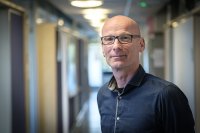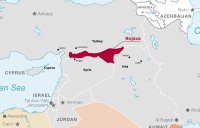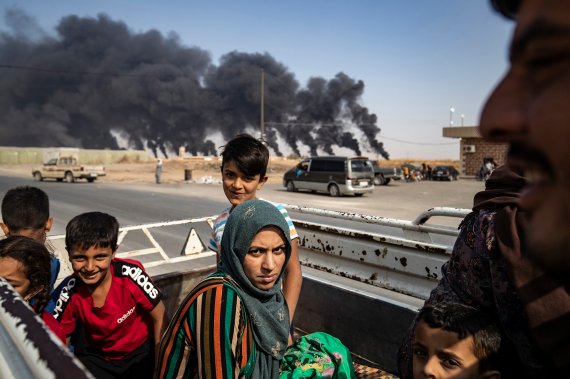‘That cannot be true,’ was Joost Jongerden’s first thought when he heard that the American president Trump was going to withdraw his troops from Syria. ‘Then I thought: he’ll be stopped by the Pentagon or by Congress. But he wasn’t.’ Turkey reacted instantly by invading Northern Syria to chase the Kurds out of the border zone. Jongerden, associate professor in the Rural Sociology chair group, looked on in dismay. Ever since the early 1990s, her has been intensively involved with the Kurds and with developments in the region. He got his PhD in 2007 for a study on the enforced migration of Kurds in Eastern Turkey. His partner is Kurdish and he regularly visits the Kurdish areas of Turkey.

What is the core of the Kurdish problem?
‘It goes back to the time when the Ottoman Empire fell apart and a nation state emerged from the remnants of it. The Ottoman Empire was made up of a highly diverse set of populations. Its policies were not based on cultural or ethical identity. With the formation of nation states, we see a governance system emerge that is based on identity politics. That is very obvious in Turkey, where the republic established in 1923 clearly linked citizenship to Turkish identity. And that sowed the seed of the Kurdish question. The Turkish government saw the expression of Kurdish identity as an existential threat. It imposed an almost continuous state of emergency on the Kurdish area of eastern turkey, and there was a strict policy of assimilation: Kurds were forced to move to cities elsewhere in the country. That is the background to the violence.’
The Kurds have no autonomy in Turkey, like they do in Syria and Iraq. Why is that?
‘That autonomy came about in the context of war. After the Gulf War in 1991, the UN declared a no-fly zone in northern Iraq. Autonomy grew up in the wake of that, and was formalized in the constitution in 2005. The central government in Iraq has reluctantly come to accept the situation. But will it always do so? The autonomous region in northeast Syria, Rojava, emerged in the context of the war in Syria. In 2012, autonomy was established in several regions and cities, where various forms of local self-rule were set up.’
What does that self-rule consist of?
‘Councils were formed locally and regionally, which try to run daily life. Those councils ensure that people get access to basic needs like food, energy and education. They try to address forms of inequality, such as gender or ethnic inequality, in a new form of governance. I call that do-it-yourself development. It is a very interesting phenomenon to me, as a development sociologist. How do you make sure government stays close to the people? How do you organize the economy? Rojava is a nice example of how people are trying to do that together. My main interest is in the way agriculture is organized. In Rojava, in the face of continuous war and danger, the Kurds have managed to set up a system of agriculture that succeeds in feeding their own population and producing surpluses for export.’
How did they manage that?
‘The land is very fertile. Under Syrian rule, there was an emphasis on monocultures. You had areas with mainly cotton, wheat or olives. After the implosion of the central regime, the farmers started diversifying production. And that was the logical thing to do, because the area was isolated by the wars going on around it. So you had to produce food yourself. Diverse production, local markets and a fair price were the leading principles in agriculture. And the diversity of the population was therefore valued and maintained. Rojava is the only part of this region organized on a non-sectarian basis.’

What can Europe do to help the Kurds in northern Syria?
‘A lot could be done if there is the political will. You could use economic sanction to put pressure on Turkey to withdraw. The economy is Erdogan’s Achilles’ heel. But you could also reflect a bit more deeply on that question. What did we do that made this possible? In 2018, Turkey invaded Afrin, part of Rojava in the far western part of northern Syria. The invasion was followed by ethnic cleansing. The international community was in no hurry to condemn that. What we are now seeing is an upscaling of what happened then. So we had been warned.’
How will this end?
‘It looks as though Putin is the dealmaker now. We don’t know how he will play his geopolitical hand. The position of the US in the region has been weakened and the Americans’ reputation has been badly damaged. Turkey is defiant but doesn’t have much international support, and Assad seems to be strengthening his position. Without any prospect of a political solution, there doesn’t seem to be much chance of the violence ending soon.’
Could there be a turn for the better?
‘There has been a lot of human suffering. That is irreversible. Turkey has occupied a small area of Rojava. The question is whether they can maintain their occupation. It is not irreversible, and democratic self-government is still functioning elsewhere. Sanctions could help to force Turkey to withdraw. If there is the political will.’

 Residents of the northern Syrian city Ras-al-Ain flee the Turkish military invasion. In the background are the fires started by Kurds to reduce visibility for the Turkish fighter pilots. Photo: Delil Souleiman/AFP
Residents of the northern Syrian city Ras-al-Ain flee the Turkish military invasion. In the background are the fires started by Kurds to reduce visibility for the Turkish fighter pilots. Photo: Delil Souleiman/AFP